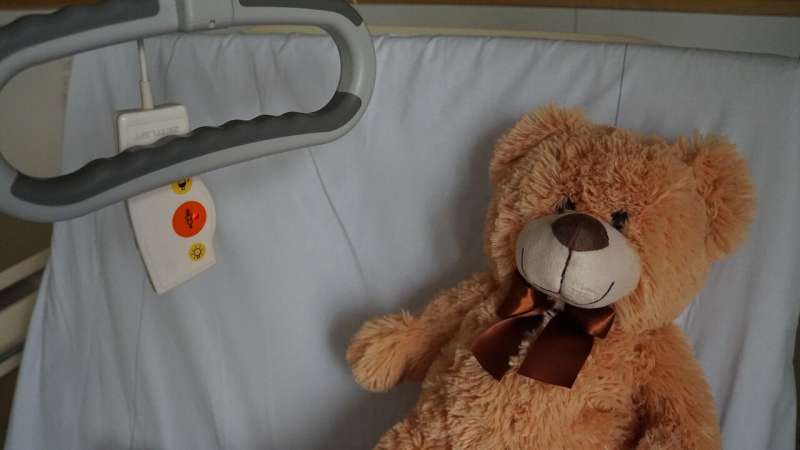This article has been reviewed according to Science X's editorial process and policies. Editors have highlighted the following attributes while ensuring the content's credibility:
fact-checked
trusted source
written by researcher(s)
proofread
Meningococcal: What to know about this potentially deadly disease affecting Australian children

Three children in far north Queensland have recently become unwell with meningococcal disease, a life-threatening infection caused by the bacteria Neisseria meningitidis.
Meanwhile, an adult and a child have been hospitalized with meningococcal in Western Australia.
So far there have been more than 80 meningococcal infections recorded across Australia in 2024. Although meningococcal disease can occur all year round, in Australia this infection occurs most commonly in late winter and early spring.
What is meningococcal disease?
Neisseria meningitidis is among the bacteria that frequently live quite harmlessly at the back of our throats, and can be spread from one person to another via saliva. Sometimes, these bacteria can invade the body via the bloodstream and cause serious disease (called "invasive meningococcal disease").
Although anyone can get meningococcal disease, certain groups are at higher risk. These include infants, toddlers, adolescents, Aboriginal and Torres Strait Islander people, young people who live in close quarters, and people who smoke.
Meningococcal disease most frequently presents as a serious bloodstream infection (septicemia) and can also spread to the brain (meningitis).
Symptoms of meningococcal disease can include fever, shakes, nausea, vomiting, lethargy, and joint and muscle pain. If meningitis occurs, headaches, neck stiffness and sensitivity to light are also common.
Sometimes, meningococcal disease can also cause a characteristic rash that doesn't disappear when pressure is applied. It may start as red or purple pin-prick spots, or as small bruises. But not everyone with meningococcal disease will present with a rash. And when it does occur, it's often a late sign, indicating the infection is well advanced.
Infants and young children may not have the classic symptoms listed above. Instead, they may have difficulty feeding, irritability, a high-pitched cry, pale or blotchy skin, or tiredness and floppiness.
While meningococcal disease is rare, it's sudden and unpredictable. It's notorious for how quickly it can progress to serious illness, often in otherwise healthy people. It has been described as the disease that can leave someone "well at breakfast—and dead by dinner."
Meningococcal disease requires urgent medical treatment, particularly antibiotics to stop the infection from progressing. Even with excellent medical care, 1 in 20 young children who contract the disease may die, and around one-third of children and adolescents who survive the disease will develop permanent complications.
While meningococcal disease can be contagious, it's less contagious than many other infections (such as influenza or measles). The bacteria can spread via respiratory or throat secretions (saliva or spit), and person-to-person transmission generally requires prolonged, close contact.
We have effective vaccines
There are different types of the N. meningitidis bacteria, called serogroups. The serogroups denote different structures of the surface of the bacteria and are referred to by letters of the alphabet. Serogroups A, B, C, W and Y cause most of the meningococcal disease around the world.
Two main types of meningococcal vaccines are available in Australia. One type protects against serogroups A, C, W and Y (ACWY), and the other type protects against serogroup B.
The ACWY vaccine has been available for free under Australia's National Immunization Program since 2018, and is given at 12 months of age, and at age 14–16.
The meningococcal B vaccine is recommended for all children but is only available for free under the National Immunization Program for certain people. This includes Aboriginal and Torres Strait Islander children under two and people with certain medical conditions.
Queensland recently introduced a state-funded program to provide free meningococcal B vaccines to all infants and children aged six weeks to two years, and adolescents aged 15 to 19.
South Australia also has a state-funded meningococcal B vaccination program for infants under one, alongside a school program for year 10 students.
In other parts of Australia, for children not meeting the high-risk criteria, the meningococcal B vaccine needs to be purchased on a private script. Many parents aren't aware of this vaccine, and cost can be a barrier too.
Most infants who start their meningococcal B vaccine course at less than one year old will require three doses, while any child aged over one will require two doses for optimal protection.
Why are we still seeing cases?
Australia has achieved good vaccine coverage against serogroups A, C, W and Y, and there are now very few cases of meningococcal disease caused by these serogroups (although the adult case recently reported in WA had serogroup Y).
However, the number of people vaccinated against meningococcal B is much lower. This is partly because this vaccine is not part of the National Immunization Program (other than for specific high-risk groups). But even in states with funded programs, there appears to be a lack of awareness.
Despite Queensland's rollout of the free meningococcal B vaccine program this year, uptake of the vaccine has been low. There are 40,000 young children under two and 386,000 adolescents aged 15–19 in Queensland who are yet to be fully immunized.
So there's less community-wide immunity to meningococcal B compared to other serogroups. Meningococcal B is now responsible for more than 80% of all meningococcal disease cases in Australia—including the three children recently affected in Queensland and the child in WA.
The Royal Australian College of General Practitioners has urged families to book in their eligible children for vaccination against meningococcal disease via free state-based programs in Queensland and SA.
In other states, families can request meningococcal B vaccination from their GP, and some hospital services provide "drop in" immunization clinics to help families catch-up on missed vaccines, including the meningococcal B vaccine. Often hospital pharmacies will provide it at the lowest cost.
This article is republished from The Conversation under a Creative Commons license. Read the original article.![]()


















